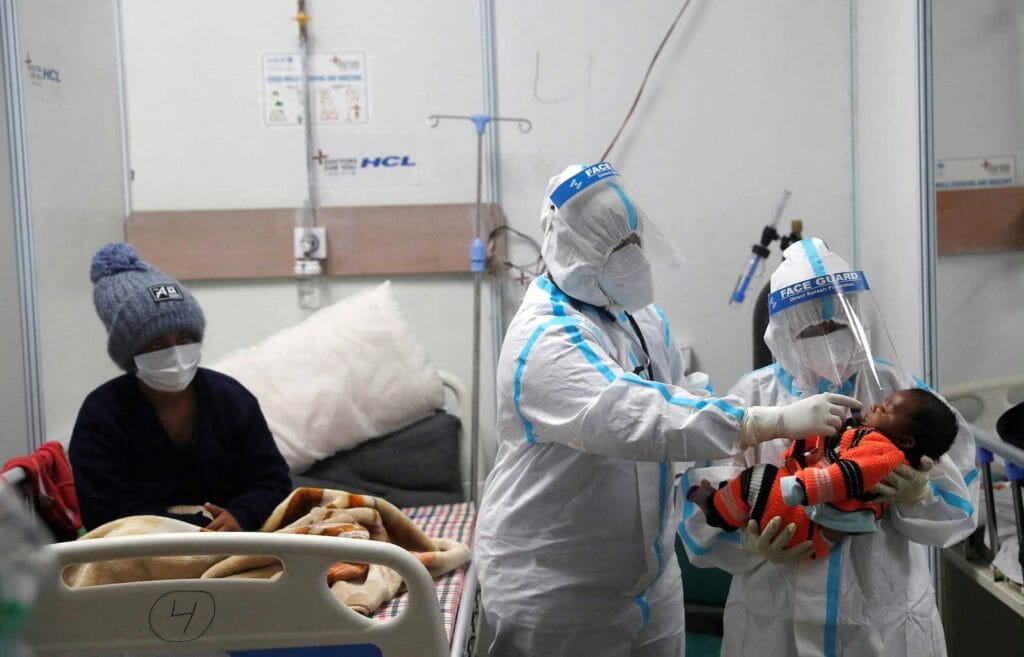Pandemic may be affecting infants’ brains

Medical workers wearing personal protective equipment (PPE) check temperature of an infant, whose mother is suffering from coronavirus disease (COVID-19), inside a care centre at an indoor sports complex, amidst the spread of the disease, in New Delhi, India, January 5, 2022. REUTERS/Adnan Abidi
The following is a summary of some recent studies on COVID-19. They include research that warrants further study to corroborate the findings and that has yet to be certified by peer review.
Pandemic may be affecting infants’ brains
Coronavirus infection during pregnancy does not appear to affect infants’ brain function, but the pandemic itself may be having an impact, a study published on Tuesday in JAMA Pediatrics suggests.
Researchers in New York City tracked 255 full-term infants born during the pandemic, including 114 whose mothers had COVID-19 during pregnancy. When the babies were six months old, the researchers saw “absolutely no effect of maternal infection with SARS-CoV-2” on neurodevelopment, said Dr. Dani Dumitriu of Columbia University and New York State Psychiatric Institute.
But overall, compared with 62 infants born before the pandemic, the babies born during the health crisis had slightly lower scores on tasks involving large muscles, tasks requiring small muscle movements, and personal interactions. The findings do not necessarily mean these infants will suffer long-term consequences, Dumitriu said. Assessments at six months are poor predictors of long-term outcomes, she added.
If additional research confirms that birth during the pandemic negatively impacts neurodevelopment, she said, “because this is such an early time point there are lots of opportunities to intervene and get these babies onto the right developmental trajectory.”
Coronavirus can trigger kidney scarring
The coronavirus can directly damage the kidneys by initiating a cascade of molecular events that leads to scarring, new laboratory research found. The resulting scar tissue could have long-term impacts on survivors’ kidney function, according to a report published in Cell Stem Cell.
The researchers exposed tiny replicas of kidneys to the SARS-CoV-2 virus in test tubes. They found the virus could infect multiple types of kidney cells and trigger “a molecular switch” that starts the scarring process. The findings suggest that high rates of kidney function decline seen in a separate study of more than 90,000 COVID-19 survivors might be due to scarring of the kidney by the virus, the researchers said.
Jitske Jansen of Radboud University Medical Center in The Netherlands said in a statement that her team had found another “piece of the puzzle showing the deleterious effects the virus can have in the body.”
Lower COVID-19 risks seen after weight-loss surgery
Weight-loss surgery may reduce the risk of severe COVID-19 even if the infected person is still obese after losing weight, according to a report in JAMA Surgery.
Researchers studied 20,212 obese adults, including 5,053 who had undergone bariatric surgery before the pandemic and lost a substantial amount of weight. On average, the people in the surgery group, while still technically obese, weighed about 44 pounds (20 kg) less than study participants who had not undergone the surgery. Although the two groups had similar rates of SARS-CoV-2 infection at about 9%, infected patients with prior weight-loss surgery had a 49% lower risk of hospitalization, a 63% lower risk of need for supplemental oxygen, and a 60% lower risk of becoming critically ill or dying compared to the non-surgery group. Obesity is well known to be a risk factor for poor COVID-19 outcomes, but as the study was not a randomized trial it cannot prove weight-loss surgery caused the better outcomes. Still, the authors said, patients who underwent weight-loss surgery were likely healthier when they became infected.
The results “support the reversibility of the health consequences of obesity” for patients with COVID-19, coauthor Dr. Steven Nissen of the Cleveland Clinic said in a statement. “This study suggests that an emphasis on weight loss as a public health strategy can improve outcomes during the COVID-19 pandemic… That is a very important finding considering that 40% of Americans have obesity. “

